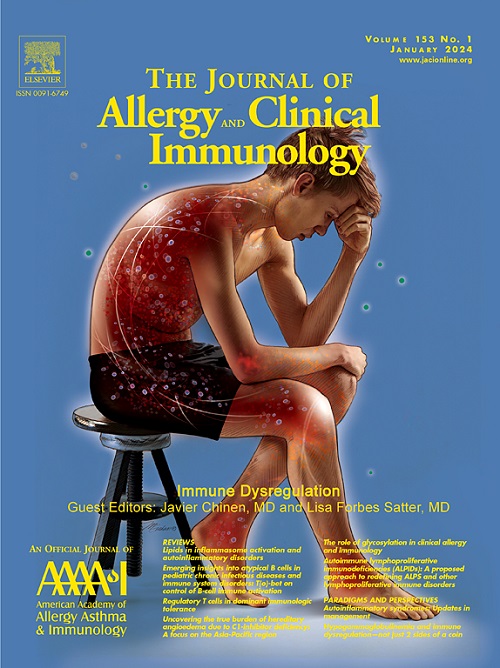IL-4 acts on skin-derived dendritic cells to promote the TH2 response to cutaneous sensitization and the development of allergic skin inflammation
IF 11.4
1区 医学
Q1 ALLERGY
引用次数: 0
Abstract
Background
Atopic dermatitis is characterized by scratching and a TH2-dominated local and systemic response to cutaneously encountered antigens. Dendritic cells (DCs) capture antigens in the skin and rapidly migrate to draining lymph nodes (dLNs) where they drive the differentiation of antigen-specific naive T cells.
Objective
We sought to determine whether non–T-cell–derived IL-4 acts on skin-derived DCs to promote the TH2 response to cutaneously encountered antigen and allergic skin inflammation.
Methods
DCs from dLNs of ovalbumin (OVA)-exposed skin were analyzed by flow cytometry and for their ability to polarize OVA-specific naive CD4+ T cells. Skin inflammation following epicutaneous sensitization of tape-stripped skin was assessed by flow cytometry of skin cells and real-time quantitative PCR of cytokines. Cytokine secretion and antibody levels were evaluated by ELISA.
Results
Scratching upregulated IL4 expression in human skin. Similarly, tape stripping caused rapid basophil-dependent upregulation of cutaneous Il4 expression in mouse skin. In vitro treatment of DCs from skin dLNs with IL-4 promoted their capacity to drive TH2 differentiation. DCs from dLNs of OVA-sensitized skin of Il4−/− mice and CD11c-CreIl4rflox/− mice, which lack IL-4Rα expression in DCs (DCΔ/Δll4ra mice), were impaired in their capacity to drive TH2 polarization compared with DCs from controls. Importantly, OVA-sensitized DCΔ/Δll4ra mice demonstrated impaired allergic skin inflammation and OVA-specific systemic TH2 response evidenced by reduced TH2 cytokine secretion by OVA-stimulated splenocytes and lower levels of OVA-specific IgE and IgG1 antibodies, compared with controls.
Conclusions
Mechanical skin injury causes basophil-dependent upregulation of cutaneous IL-4. IL-4 acts on skin DCs that capture antigen and migrate to dLNs to promote their capacity for TH2 polarization and drive allergic skin inflammation.
IL-4 作用于皮肤衍生的树突状细胞,促进 Th2 对皮肤过敏的反应,并引发过敏性皮肤炎症。
背景:特应性皮炎的特点是搔抓以及对皮肤接触到的抗原产生以 Th2 为主导的局部和全身反应。树突状细胞(DCs)捕捉皮肤中的抗原并迅速迁移到引流淋巴结(dLNs),在那里它们驱动抗原特异性幼稚 T 细胞的分化:目的:确定非T细胞衍生的IL-4是否作用于皮肤衍生的DC,以促进Th2对切面抗原和过敏性皮肤炎症的反应:方法: 通过流式细胞术分析了来自暴露于卵清蛋白(OVA)的皮肤dLN的DCs,并分析了它们极化OVA特异性幼稚CD4+ T细胞的能力。通过皮肤细胞流式细胞术和细胞因子 qRT-PCR 技术评估了带状皮肤表皮(EC)致敏后的皮肤炎症。细胞因子分泌和抗体水平通过 ELISA 进行评估:结果:划痕会上调人体皮肤中 IL4 的表达。同样,胶带剥离也会导致小鼠皮肤Il4表达的快速上调。用IL-4体外处理来自皮肤dLNs的DCs可提高它们驱动Th2分化的能力。与对照组相比,Il4-/-小鼠和CD11cCreIl4rflox/-小鼠皮肤中缺乏IL-4Rα表达的DC(DCΔ/Δll4ra小鼠)的OVA致敏皮肤dLN中的DC驱动Th2分化的能力受损。重要的是,与对照组相比,OVA致敏DCΔ/Δll4ra小鼠的过敏性皮肤炎症和OVA特异性全身Th2反应受损,表现为OVA刺激脾细胞分泌的Th2细胞因子减少,OVA特异性IgE和IgG1抗体水平降低:结论:机械性皮肤损伤导致嗜碱性粒细胞依赖性皮肤IL-4上调。IL-4作用于捕获抗原并迁移至dLNs的皮肤DC,促进其Th2极化能力并驱动过敏性皮肤炎症。
本文章由计算机程序翻译,如有差异,请以英文原文为准。
求助全文
约1分钟内获得全文
求助全文
来源期刊
CiteScore
25.90
自引率
7.70%
发文量
1302
审稿时长
38 days
期刊介绍:
The Journal of Allergy and Clinical Immunology is a prestigious publication that features groundbreaking research in the fields of Allergy, Asthma, and Immunology. This influential journal publishes high-impact research papers that explore various topics, including asthma, food allergy, allergic rhinitis, atopic dermatitis, primary immune deficiencies, occupational and environmental allergy, and other allergic and immunologic diseases. The articles not only report on clinical trials and mechanistic studies but also provide insights into novel therapies, underlying mechanisms, and important discoveries that contribute to our understanding of these diseases. By sharing this valuable information, the journal aims to enhance the diagnosis and management of patients in the future.

 求助内容:
求助内容: 应助结果提醒方式:
应助结果提醒方式:


